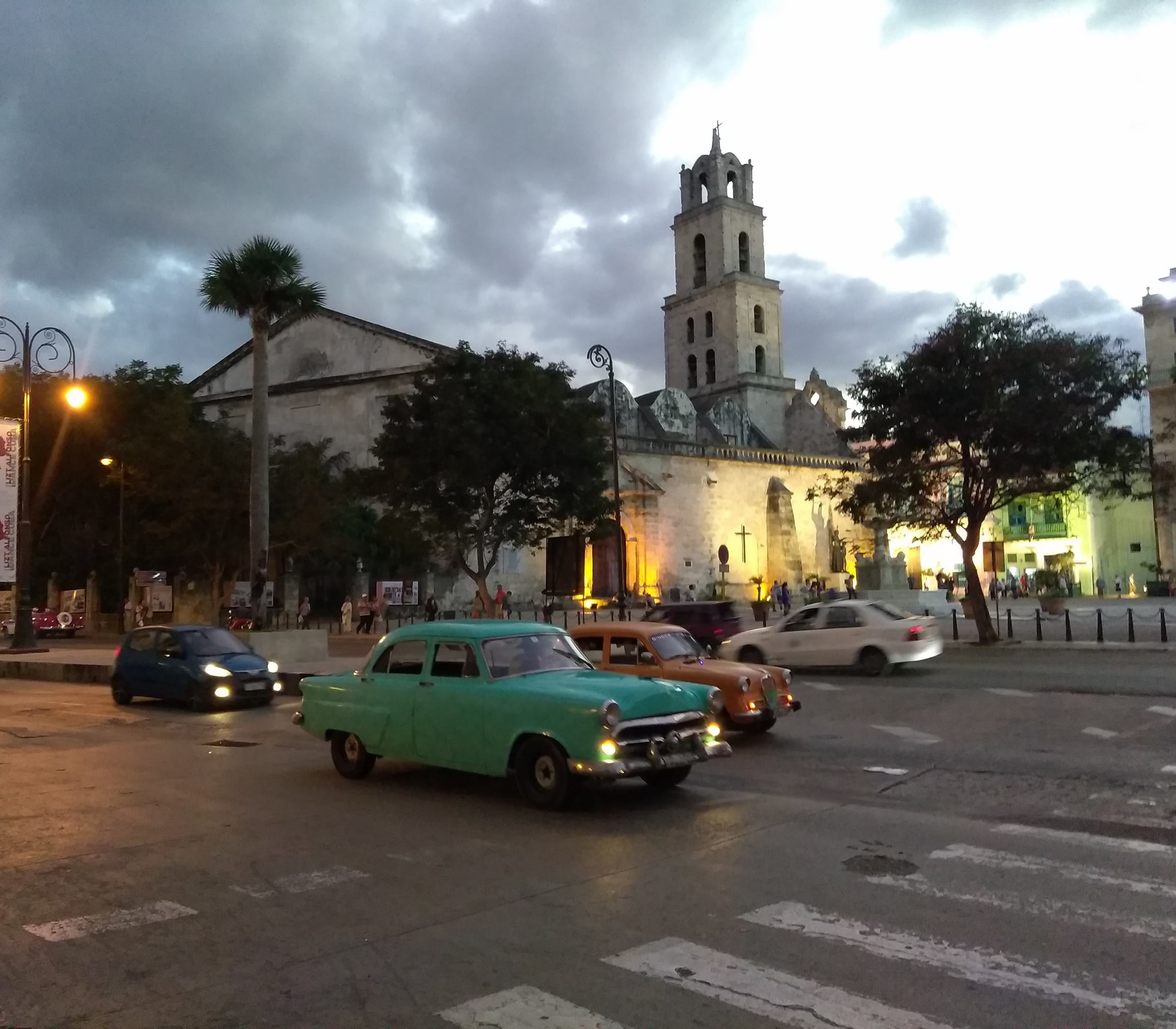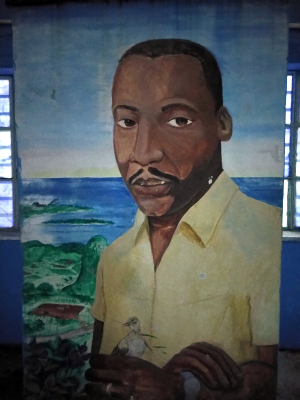For 9 days I sat in living rooms, walked streets and rode in taxis made in 1951. I climbed hills and reveled over the brilliance of organic farms. I learned about AfroCuban religion and culture, trekked through the Zapata Swamp, waded and meditated in the waters of the Playa Girón (Bay of Pigs), spoke with Cuban economists, nurses, doctors, students, farmers, revolutionaries, taxi drivers, permaculturalists, and agriculturalists. I visited a worker/owner cooperative restaurant, cooperative organizations, and an artist collective. I soaked up the sites of Old Havana and Havana, Varadero, Alamar, and other brilliantly fascinating parts of Cuba. I was mesmerized by brilliant young Cuban dancers, musicians, and Cuban jazz artists who sang a mixture of cover songs and original works. Visiting Cuba was a dream come true and I am grateful to the Center for Global Justice for making it a possibility. I went to Cuba as part of a co-op delegation focused primarily on agriculture.
 Halfway through my trip, I went to bed on November 25th feeling full emotionally and overwhelmed with the love and spirit I was receiving from the Cuban people. For me, just having the opportunity to travel to Cuba was historic. Plus, I was staying at the Martin Luther King Memorial Center in Havana, which meant a great deal.
Halfway through my trip, I went to bed on November 25th feeling full emotionally and overwhelmed with the love and spirit I was receiving from the Cuban people. For me, just having the opportunity to travel to Cuba was historic. Plus, I was staying at the Martin Luther King Memorial Center in Havana, which meant a great deal.
I could have never imagined that I would wake on the morning of November 26th to learn that Fidel Castro had passed the evening before. What a historic time to be in Cuba! I witnessed elder men and women crying in the streets. I listened to younger Cubans speak about their conflicting emotions wrapped up in love, respect, and at times, conflicted resentment. I gathered in the streets and broke bread with my newly gained Cuban family as they mourned and weighed in on their tremendous and historic loss. Many I spoke with had no idea how big a deal Castro’s passing would be in the US. I told them that I was almost certain that the story was flooding the airways in America with almost as much frequency as it was in Cuba. However, that with the exception of revolutionaries or social justice activists, the narrative and responses around Castro in the US were likely far different. I came home to find I was right.
There was no shortage of discussion around the most recent US presidential election and the future of US/Cuba relations. Most people I spoke with expressed concerns about Trump’s potential reversal of President Obama’s attempt to normalize Cuban relations. I shared similar concerns.
I spoke with economist Gladys Hernández who talked a lot about the big questions that faced Cuba at the end of the Soviet Union. “Was Cuba supposed to remain a socialist country? What do you do when the markets are changing?” and the big question that she feels Cuba is facing now: “How can Cuba develop infrastructure and increase efficiency in productivity?” She revealed that Cuba now has over 300 hotels, up from under 90 and growing.
I expressed my appreciation for the current Cuban culture, their preservation of history, and the “make a way out of no way” spirit that was reminiscent of my hometown Detroit. I talked about the kindred spirit I felt with the Cuban people who had figured out how to exist and maintain their dignity while struggling through resource extraction and marginalization. I referenced my anxiety around the US “coming back” for Cuba in ways eerily similar to the “comeback story” in Detroit that leaves out the people who have loved on and taken care of their hometown when the rest of the world abandoned her.
 I talked about my fear around the young people in Cuba turning away from agricultural work in order to work in tourism. It made me think a lot about growing up with gardens on my street, only to witness a lack of food in those same neighborhoods within a decade.
I talked about my fear around the young people in Cuba turning away from agricultural work in order to work in tourism. It made me think a lot about growing up with gardens on my street, only to witness a lack of food in those same neighborhoods within a decade.
I shared my concerns around the emphasis on development and infrastructure, which tends to mow over edible plants and trees for paved streets, buildings and commodities. I couldn’t help but mention my caution around the global corporate investors who would likely come to Cuba for cheap labor and trade rooted in capitalistic exploitation.
Gladys didn’t seem to be as worried as me. She referenced Cuba’s relationship with China. She said that although Cuba has a decent relationship with China, China does not have a ton of products in Cuba and they have not exploited the Cuban labor force because they consider the Cuban labor force “hostile.” Cubans have an educated workforce and will negotiate their salaries. Gladys also referenced that Cuba has also been trading with Venezuela, Canada, China, and others for many years and have managed to hold their own. Her assessment gave me some measure of comfort. Although I still felt uneasy.
As I visited many parts of Cuba I was grateful to not feel pressured to eat at a fast-food restaurant, shop at a corporate giant, or be bombarded by corporate advertisers. It was fascinating to walk past billboards and businesses and not see much promotion about some new and upcoming item available for purchase. It was refreshing to be disconnected from corporate media and have time to reflect and appreciate the nature around me.
I miss Cuba already. It felt so much like home. It was warm. It was welcoming. It was love. I miss the smiles, the buenos dias and hola sounds I heard frequently throughout the day. Folks were greeting me just because I was there. That was also reminiscent of the Detroit I grew up in. The Detroit I love.
Before I left, I shared Peace Zones for Life signs with the Martin Luther King Memorial Center in honor of Ancestor Ron Scott, on the anniversary of his passing. I gifted Gladys and my Cuban guides at the Center a copy of In Love and Struggle: The Revolutionary Lives of James and Grace Lee Boggs, the films American Revolutionary: The Evolution of Grace Lee Boggs and We Are Not Ghosts, a Spanish translated version of a discussion between Grace Boggs and Immanuel Wallerstein, a couple of {r}evolution t-shirts (signature t-shirts of the Boggs Center), and my own book Coming Out My Box.
I wanted to leave Cuba with at least a fraction of what Cuba had given to me and I wanted to be sure that organizers at the MLK Memorial Center could feel connected to the organizing and {r}evolutionary spirit in Detroit long after I left.
I definitely felt a kindred spirit with the Cuban people. It is my hope that they are able to preserve the warmth, culture, history, personal stories, and agriculture that is particular to Cuba, despite what promises to be a rapidly changing moment in history.
I know that I have made some lifelong friends there and I hope to go back someday.



